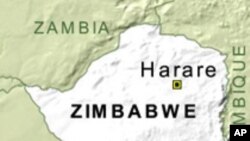Several aid organizations are planning to set up centers in Zimbabwe where victims of sexual abuse can get physical and psychological help. The three organizations involved in this project, the International Organization for Migration, the U.N. Children's Fund and the U.N.'s Population Fund say their assistance is desperately needed in a country where sexual abuse is rampant and the victims have nowhere to turn for help.
The three organizations conducted a survey earlier this year in the Zimbabwean capital, Harare and several rural provinces. It found the social, political and economic instability in the country had led to an increase of sexual abuse of women, girls, and even some boys.
More than 50 percent of the 1,900 people interviewed, both male and female, said they were forced to have sex against their will. Nearly half of the respondents said they did not know what to do to cope with rape experiences.
Spokesman for the International Organization for Migration, Jean-Philippe Chauzy, tells VOA the victims of sexual abuse are devastated by their experience and they have very little recourse to help.
"There is a lot of stigmatization within the society against people who have suffered these sexual abuses and therefore there is no possibility for victims to speak out, seek counseling and support," said Jean-Philippe Chauzy. "So, without this support, without this counseling, without the medical assistance, obviously people will be marked for life and will be stigmatized in society, which means that their future remains very bleak."
Chauzy says the program being set up by IOM and the UN agencies aims to de-stigmatize victims of sexual abuse and rape. He says it is important that people who have suffered sexual abuse are able to speak out and seek the assistance they deserve and need.
But, many people, he notes, hesitate to come forward and ask for help.
"For instance, the survey that we carried out earlier in May showed about 30 percent of the women who had suffered from sexual abuse did not know what to do," he said. "They did not know who to turn to. And, therefore, the fact that, with our partners, we will be setting up clinics in various provinces of Zimbabwe would, hopefully, address some of those needs. For the time being, what we have is one hospital in Harare that can basically deal with victims of sexual abuse. That obviously is not enough considering the extent of the phenomenon."
Chauzy says the centers will provide health care, psychological and social support and legal aid to victims of gender-based violence. He says they will target about 150,000 people, mostly women and children, but also some men.
He says the centers will offer other assistance as well, including life skills and livelihood training. He says people who have the means and ability to care for themselves will lessen the risk of their becoming victims in the future.
News
Aid Groups Say Sexual Abuse Rampant in Zimbabwe
update




